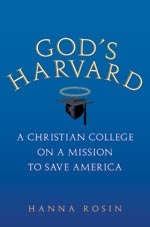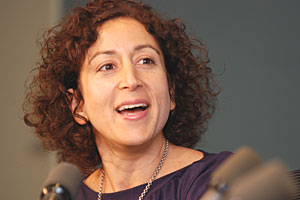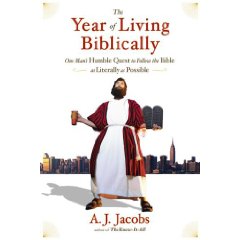Hospital Reading: America’s Most Religious College Students
This weekend ReligionWriter found herself at an area hospital, watching over her one-year-old son, Moses, who was suffering from respiratory problems (he’s better now, and we’re both home, thank you.) But there’s nothing like being captive in a strange, somewhat scary place to make a book seem like a treasured escape. While rocking Moses to sleep, RW finished reading God’s Harvard: A Christian College on a Mission to Save America, a recent book by Hanna Rosin, an accomplished journalist and mother of two, about Patrick Henry College.

Rosin tells us about Elisa Muench, a Patrick Henry undergrad with the ambition to work in the White House, who is also puzzling through how her career vision will mesh with a commitment — seemingly shared by all students at Patrick Henry — to quit her job and homeschool her own children when the time comes. (And the horizon for childbearing at Patrick Henry is quite near; many students are engaged when they graduate and express a desire to have children right away — no delayed childbearing for these folks.)
The book picks up where the New Yorker story ended, and Elisa becomes engaged to a tall, handsome student politician. After graduation, Elisa was planning to move far from Washington with her husband in order to accommodate his Marine Corps officer training, and she is cautiously optimistic that she’ll find some way to “contribute.” (RW would like to give you some direct quotes from the book here, but, hey, Harcourt folks: This book has no index!)
RW began to wonder, however, if the book’s readability depended somewhat on Rosin’s tantalizing but unspoken mission: to show us the contradictions of people whose very mission is to deny contradictions. Because Rosin presents Patrick Henry students as so completely earnest and squeaky clean and unironic that the reader begins to long for a good scandal, some underbelly of this kingdom-of-God-on-earth.
The book does not disappoint in this department: Rosin was lucky enough to be on campus in 2006 when Patrick Henry’s “9/11″ happened (that was the description from students,) and several of the more independent-minded professors were fired or quit. It was hard, as a reader, not to feel some deep satisfaction that this experiment, conceived of by the school’s founder, Michael Farris, to reconcile literal biblicalism with modern intellectualism, appeared doomed to failure.
Is Rosin responsible for evoking this feeling? Presumably this perverse sense of satisfaction reflects RW’s own biases. But for all of her skill in reporting, writing and — most amazingly — gaining access to the school even after her critical New Yorker piece ran, RW felt Rosin lacked a certain sympathy for her subjects. Rosin writes in her introduction that of course she was a particularly hard nut for the evangelicals at Patrick Henry to crack. She says of her

I am Jewish, and most of my family lives in Israel; I spent my teenage years in Queens, New York, in the eighties, where my idea of a dress code was matching my miniskirt to my handball gloves. I work and leave my children for several hours a week in the charge of a babysitter who is (gasp!) not related to me. I firmly believe the earth is 4.5 billion years old, or whatever the current scientific consensus says. I have many beloved gay friends and have never once suggested to any of them that they enter into reparative therapy to “cure their disease.”
In other words, she begins from a cultural point of view that is, in many ways, hostile to the kind of Bible-based evangelicalism represented by Patrick Henry. Although Rosin deeply embedded herself in the life of the college, listening to and recording and publishing points of view that were very contrary to her own, some of her personal distance from the Patrick Henry outlook colors her writing. For example when she writes about Basic Principles for Life, a handbook by an ultra-conservative proponent of Christian homeschooling, she writes that the bulk of the book “speaks for itself: ‘This may sound strange to you, but have you ever thought about dedicating your clothes to God?” Uh, no.”
This subtly mocking tone, which appears infrequently throughout God’s Harvard, was more common in reporting on evangelicals and other religious groups a number of years ago, when reporters tended to be more uncritical about their own biases against religious people, and, as a result, the devout were often presented to the public as an alien species. As religious historian Wilfred McClay said last week at a Pew Forum event in Key West:
It’s very hard for people to cover subjects for which they have absolutely no sympathy. I do think it’s important to make sure you hire people who have some interest in religion if you want them to cover religion.
RW suggests God’s Harvard might have been a little more nuanced if Rosin had more affinity, cultural or otherwise, to the students there. For example, would the book have been much different if she were writing about an ultra-Orthodox yeshiva?
As RW saw in journalist A. J. Jacobs‘ entertaining book, The Year of Biblically: One Man’s Humble Quest to Follow the Bible as Literally As Possible, (which she listened to via Audible.com during

The bottom line, though, is that in spite of Rosin’s somewhat alienated stance in relation to her subjects, she brings the power of excellent journalism to a fascinating topic and the result is a very worthwhile book — hopefully, you won’t need a hospital visit to find time to read it.
For an interesting conversation between Rosin and Michael Lindsay (interviewed earlier by RW,) see this Pew Forum event featuring the two authors (and copy-edited by yours truly.)
Sphere: Related Content
Comment by Kimberly Winston on 11 December 2007:
I really like what you said about the “subtly mocking” tone of “God’s Harvard.” I have not yet read the book, but do remember the New Yorker piece. I had that problem with Jon Krakauer’s “Under the Banner of Heaven.” I felt it would have been a much stronger book had he not so boldly mocked Mormonism in general, not just the Mormon fundamentalists the book was about. As religion reporters, we all have our biases, and I sometimes feel I have more than my fair share. I have often found myself thinking, “You really believe that????” when I am working, but I would never, EVER purposely out that in my work. When other writers do, I think they make it harder for the rest of us to do our job. Thanks, Andrea, for a meaty review.